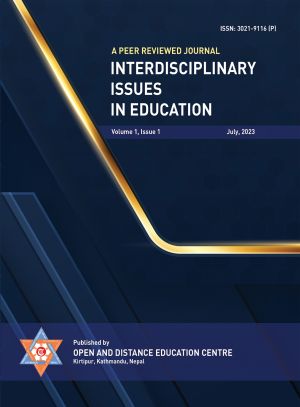Pedagogical Accountability of Teachers in Community Schools of Nepal: Lessons from a Case Study
DOI:
https://doi.org/10.3126/iie.v1i1.58789Keywords:
Pedagogical accountability, three-phases model, national curriculum framework, community schoolAbstract
The teacher's instructional guideline provided by the National Curriculum Framework of Nepal for pedagogical accountability is insufficient to enhance the student's classroom performance. The main objective of this study is to assess science teachers' efficiency in enhancing students' learning with a focus on the basic pedagogical accountability in community schools of Tikapur Municipality. A qualitative study among two groups of stakeholders:, science teachers and principals of three different institutions, was conducted by including a three-phase conceptual model: the pre-active phase, the interactive phase, and the post-active phase. Based on the interpretive philosophical research paradigm, information was gathered through in-depth semi-structured interviews and observation of science classroom activities. The operationalization of accountability assessment was further done by observing the methods of classroom teaching, goal management, and choice of teaching methodology by the teachers, and the use of different techniques by the teachers to motivate students and create an effective teaching environment. We found that intervention in all three phases of science teaching brought positive and effective changes among science teachers when they were committed to students and adopted innovative teaching with clear planning. The study also showed that teachers' accountability can be measured through teacher skills, techniques, and strategies reflecting innovation and inquisitiveness in and out of the classroom. Overall, especially in science subjects, practical sessions were found highly impactful on students’ learning and understanding of basic knowledge of science particularly when they were associated with daily activities and were taught with necessary scaffolding.
Downloads
Downloads
Published
How to Cite
Issue
Section
License
Copyright (c) 2023 Open and Distance Education Centre (ODEC)

This work is licensed under a Creative Commons Attribution 4.0 International License.
CC-BY-4.0. This license enables reusers to distribute, remix, adapt, and build upon the material in any medium or format, so long as attribution is given to the creator. The license allows for commercial use.




